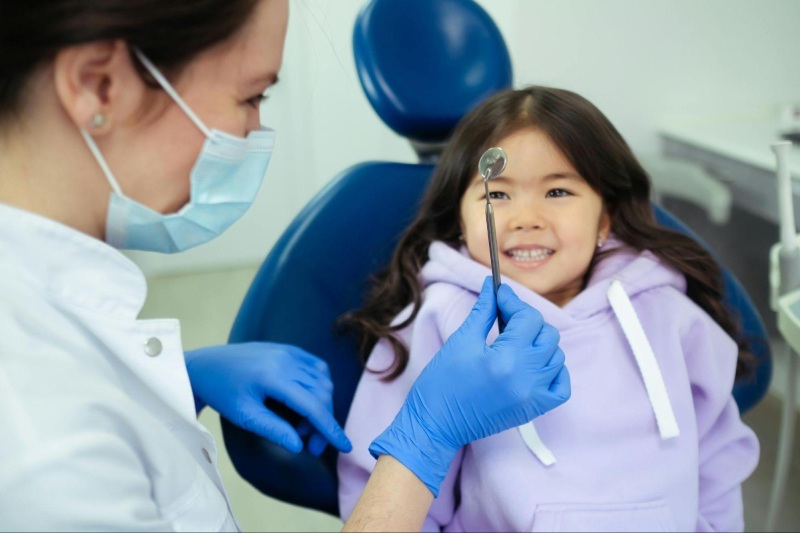As parents, we all want to make sure our children are growing up happy and healthy – and that includes their dental health. Most of us are familiar with the basics, like regular check-ups with the dentist and good brushing habits. But beyond those basics, there are specific signs that may indicate your child could benefit from orthodontic care. Knowing what to watch for can make it easier to decide when to get a professional opinion.
If you’re noticing anything unusual about your child’s teeth, jaw, or even habits, it could be worth considering an orthodontic consultation. Let’s go over some common signs that may mean it’s time to take that next step.
1. Crowded or Misaligned Teeth
Crowded or misaligned teeth are among the most frequent reasons children need to see an orthodontist. Crowding happens when there isn’t enough space for all the teeth to fit properly in the mouth, which can cause them to overlap or twist. Misalignment, on the other hand, refers to how the teeth are positioned within the mouth, which can impact the child’s bite and appearance.
Crowded teeth aren’t just a cosmetic concern. They can be uncomfortable, make brushing and flossing harder, and increase the risk of tooth decay and gum disease. Parents who notice their child’s teeth crowding or shifting out of place should consider reaching out for an orthodontic evaluation.
If you’re looking for a professional nearby, look up best orthodontist near me to find trusted local options. A qualified orthodontist can help assess your child’s unique needs and recommend the best treatment plan, whether it involves braces, clear aligners, or other specialized care.
2. Early or Late Loss of Baby Teeth
Baby teeth serve as placeholders for permanent teeth, guiding them into the right spots. If your child loses their baby teeth much earlier or later than expected, it can impact the way permanent teeth come in. When baby teeth are lost prematurely, the surrounding teeth can shift into the empty space, causing alignment issues for the incoming adult teeth. On the other hand, when baby teeth are retained too long, they can prevent permanent teeth from emerging properly.
An orthodontist can assess whether the timing might affect your child’s overall dental development and make recommendations accordingly. Addressing this early on can help prevent future alignment issues.
3. Difficulty with Biting or Chewing
Does your child seem to struggle with biting or chewing their food? While we might not think twice about how we bite down, this can be a significant indicator of orthodontic issues in children. Difficulty chewing often points to bite misalignments, like overbites, underbites, or crossbites. These misalignments can make it challenging to bite down evenly, causing discomfort and, over time, possibly even jaw pain.
If you’ve observed your child avoiding certain foods or if they complain about discomfort when eating, it’s worth looking into. An orthodontist can evaluate the alignment of their bite and recommend treatment to make eating more comfortable and natural.
4. Mouth Breathing or Snoring
Mouth breathing and snoring may not seem directly related to orthodontics, but they can be signs of structural issues in the jaw or nasal passages. When a child frequently breathes through their mouth rather than their nose, it may indicate that the airway is partially blocked, often due to misalignment in the jaw or issues with bite. Mouth breathing can affect the shape of a child’s face over time, influencing their overall development.
Snoring, especially if it’s frequent, can also indicate underlying issues. An orthodontist can assess these concerns and, in many cases, recommend treatments to help address them. Whether it’s through braces, expanders, or other methods, proper orthodontic care can make a big difference in airway alignment, breathing patterns, and overall comfort.
5. Thumb Sucking Beyond Early Childhood
Thumb sucking is a normal soothing behavior for infants and young children, but if the habit persists into childhood, it can start to impact the development of the teeth and jaw. Prolonged thumb sucking places pressure on the teeth and roof of the mouth, often causing the front teeth to push forward or the upper jaw to narrow.
If your child has had trouble stopping thumb-sucking past the age of five, it’s a good idea to consult an orthodontist. They can evaluate if the habit has caused any alignment issues and recommend strategies or treatments to help.
6. Speech Difficulties Related to Dental Alignment
Speech development is an important milestone in every child’s life, and dental alignment plays a role in that process. Teeth and jaw positioning can affect how we pronounce certain sounds. If your child is experiencing speech difficulties, it’s possible that dental misalignment is a contributing factor.
For example, certain sounds require the tongue to press against the teeth, and if teeth are out of alignment, it can affect pronunciation. An orthodontist can assess the alignment of your child’s teeth and recommend treatment options if dental issues are affecting their speech. In some cases, orthodontic treatment can help support clearer pronunciation and improved speech over time.
7. Teeth Grinding or Clenching
Grinding or clenching teeth, especially while sleeping, is often an indicator of underlying bite or alignment issues. Many children may not even realize they’re grinding their teeth, but signs like worn-down teeth, jaw soreness, or even headaches can point to the habit. Grinding and clenching can cause long-term wear on the teeth and may lead to sensitivity and jaw problems if left unaddressed.
If you suspect your child may be grinding their teeth, consult with an orthodontist. They can determine if the habit is related to a bite issue and offer solutions to protect the teeth, such as a night guard or other orthodontic interventions. Preventing further wear and addressing the underlying cause can help ensure that your child’s teeth remain healthy and strong.
When it comes to orthodontic care, catching potential issues early can make a significant difference in your child’s comfort, confidence, and dental health. Orthodontic evaluations aren’t just for teenagers; younger children can also benefit from early assessments and interventions. By watching for these signs and considering professional advice, parents can help their children achieve a healthy, well-aligned smile that supports their overall well-being.
Seeking out a qualified orthodontist now can help prevent more complex issues down the road, allowing for a smoother, easier treatment process.















